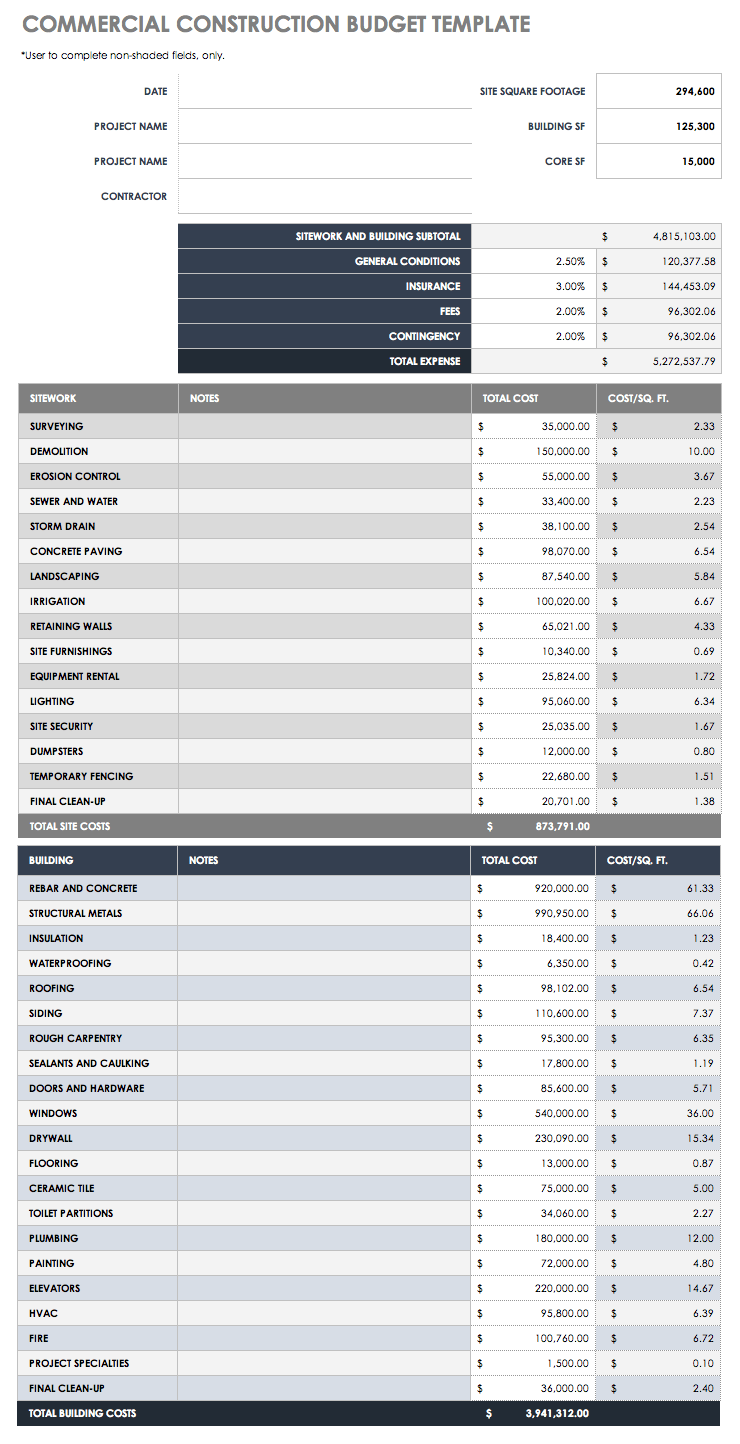Are you in the process of planning a commercial construction project and looking for a way to effectively manage your budget? A commercial construction budget template can be a valuable tool to help you stay organized and on track financially throughout the project. By using a template, you can easily track expenses, monitor costs, and ensure that you are staying within your budget constraints.
What is a Commercial Construction Budget Template?
A commercial construction budget template is a pre-designed spreadsheet or document that is used to outline all of the costs associated with a construction project. This template typically includes categories for materials, labor, equipment, permits, fees, and any other expenses that may arise during the construction process. By inputting the estimated costs and actual expenses into the template, project managers can easily compare the two and make adjustments as needed to stay within budget.
The Purpose of Using a Commercial Construction Budget Template

Image Source: smartsheet.com
The main purpose of using a commercial construction budget template is to effectively manage the financial aspects of a construction project. By having a detailed breakdown of all expenses in one place, project managers can make informed decisions about where to allocate funds, where to cut costs, and where to invest more money. This can help prevent overspending, ensure that the project stays on schedule, and ultimately lead to a successful and profitable outcome.
Why You Should Use a Commercial Construction Budget Template
Using a commercial construction budget template can offer a wide range of benefits to project managers and stakeholders. Some of the key reasons why you should consider using a template for your construction project include:

Image Source: website-files.com
1. Organization: A budget template can help you keep all of your financial information organized in one place, making it easy to track expenses and monitor costs.
2. Accuracy: By inputting estimated costs and actual expenses into the template, you can ensure that your budget is accurate and up-to-date.
3. Decision-making: Having a clear overview of your budget can help you make informed decisions about where to allocate funds and where to make adjustments.
4. Financial control: Using a budget template can help you stay in control of your finances and prevent overspending.
5. Communication: A budget template can also be a useful tool for communicating with stakeholders and investors about the financial aspects of the project.
How to Use a Commercial Construction Budget Template
Using a commercial construction budget template is a straightforward process that can be broken down into a few key steps. Here are some tips for effectively using a budget template for your construction project:
1. Determine Your Budget

Image Source: slideteam.net
Before you start using a budget template, you need to establish a budget for your construction project. Consider factors such as materials, labor, permits, and any other expenses that may arise.
2. Choose a Template
Select a commercial construction budget template that aligns with the specific needs and requirements of your project. There are many templates available online that can be customized to fit your budgeting needs.
3. Input Your Expenses

Image Source: smartsheet.com
Enter all of your estimated costs and expenses into the template, making sure to include every detail to ensure accuracy.
4. Monitor and Update Regularly
Regularly update the budget template with actual expenses to track your progress and make adjustments as needed to stay within budget.
5. Communicate with Stakeholders

Image Source: archdesk.com
Use the budget template as a tool for communication with stakeholders, investors, and other project team members to keep everyone informed about the financial aspects of the project.
6. Analyze and Adjust
Periodically review the budget template to analyze your spending and make any necessary adjustments to ensure that you are staying on track financially.
7. Be Flexible

Image Source: archdesk.com
Construction projects can be unpredictable, so it’s important to be flexible with your budget and make adjustments as needed to accommodate changes or unexpected expenses.
8. Seek Professional Help
If you are unfamiliar with budgeting or need assistance with managing your finances, consider seeking help from a financial advisor or construction project manager who can provide guidance and support.
Tips for Successful Budgeting

Image Source: smartsheet.com
Successfully managing a commercial construction budget requires attention to detail, communication, and strategic planning. Here are some tips to help you effectively use a budget template for your construction project:
Track Your Expenses: Keep detailed records of all expenses to ensure accuracy and transparency.
Regularly Review and Update: Monitor your budget regularly and make adjustments as needed to stay on track.
Communicate Effectively: Use the budget template as a tool for communication with stakeholders and team members to keep everyone informed.
Plan for Contingencies: Include a contingency fund in your budget to account for unexpected expenses or changes in the project scope.
Stay Organized: Keep all financial documents and records in one place to maintain organization and easily track expenses.
Seek Professional Advice: Don’t hesitate to consult with financial experts or project managers for guidance and support with budgeting.

Image Source: levelset.com
In Conclusion
A commercial construction budget template can be a valuable tool for effectively managing the financial aspects of a construction project. By using a template, project managers can stay organized, track expenses, and make informed decisions about where to allocate funds. By following the tips outlined above and staying proactive with budget management, you can ensure the success and profitability of your commercial construction project.

Image Source: smartsheet.com

Image Source: smartsheet.com